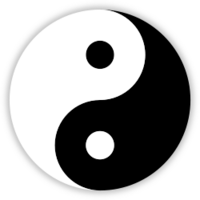Perception of interdependent opposites: Difference between revisions
>Josikins revisiting effect overhauls and proofreading/adding minor tweaks |
>Josikins grammatical overhaul |
||
| Line 1: | Line 1: | ||
<onlyinclude> | <onlyinclude> | ||
[[File:Yinyang2.png|200px|thumbnail|right|In Chinese philosophy, [http://en.wikipedia.org/wiki/Yin_and_yang yin and yang], are concepts used to describe how opposite or contrary forces are actually complementary, interconnected and interdependent in the natural world.]] | [[File:Yinyang2.png|200px|thumbnail|right|In Chinese philosophy, [http://en.wikipedia.org/wiki/Yin_and_yang yin and yang], are concepts used to describe how opposite or contrary forces are actually complementary, interconnected, and interdependent in the natural world.]] | ||
'''Perception of interdependent opposites''' can be described the experience of a powerful subjective feeling that reality is based upon a binary system in which the existence of fundamentally important concepts or situations logically arise from and depend upon the co-existence of their opposite. This perception is not just understood at a cognitive level, but manifests as intuitive sensations which are felt rather than thought by the person. | '''Perception of interdependent opposites''' can be described the experience of a powerful subjective feeling that reality is based upon a binary system in which the existence of fundamentally important concepts or situations logically arise from and depend upon the co-existence of their opposite. This perception is not just understood at a cognitive level, but manifests as intuitive sensations which are felt rather than thought by the person. | ||
Revision as of 04:25, 11 April 2018

Perception of interdependent opposites can be described the experience of a powerful subjective feeling that reality is based upon a binary system in which the existence of fundamentally important concepts or situations logically arise from and depend upon the co-existence of their opposite. This perception is not just understood at a cognitive level, but manifests as intuitive sensations which are felt rather than thought by the person.
This experience is usually interpreted as providing a deep insight into the fundamental nature of reality. For example, concepts such as existence and non-existence, life and death, up and down, self and other, light and dark, good and bad, big and small, pleasure and suffering, yes and no, internal and external, hot and cold, young and old, etc are felt to exist as harmonious forces which necessarily contrast their opposite force in a state of equilibrium.
Perception of interdependent opposites is often accompanied by other coinciding transpersonal effects such as ego death, unity and interconnectedness, and perception of eternalism. It is most commonly induced under the influence of heavy dosages of psychedelic compounds, such as LSD, psilocybin, and mescaline.
Psychoactive substances
Compounds within our psychoactive substance index which may cause this effect include:
Experience reports
Anecdotal reports which describe this effect within our experience index include:
- Experience:150mg MDMA + 20mg 2C-B - I designed it this way myself
- Experience:2.5g Psilocybe Cubensis B+ strain - epiphany of nondualistic reality
- Experience:20mg - A profound sense of oneness
- Experience:80mg - progressing deeper into states of unity and interconnectedness
- Experience:Unknown Dose DOC (Insufflated) - Overdosing and Terifying Ego Death
- Experience:Unknown dosage / 3 tabs - Ego death and a total break through in the snow
See also
- Responsible use
- Subjective effects index
- Psychedelics - Subjective effects
- Dissociatives - Subjective effects
- Deliriants - Subjective effects
External links